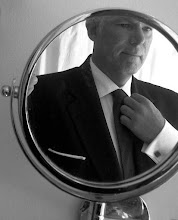Jazz master Wynton Marsalis recently told CNN that blues has always been a marginalized form of music because of racism. “It came from who we didn't like. That's what it was -- it wasn't that we couldn't see it. It was who it came from, we did not like them.” He explained that blues music is in country, in jazz, in rock and roll but when its straight up blues, its been institutionally exploited for profit or flat out rejected by white recording companies and is therefore now rejected by the African American community as well.
Case in point... last night, I went to a Discovery Music series blues concert at the local Attucks Theatre in Norfolk, Virginia and was surprised when the MC told the roughly 40 people in the mostly empty theatre, “I’m glad to see so many more people coming out for events than we had last year.” It made me sad to see the historic black theatre so empty for a young musician, John Bigham (The soul of John Black), who mixes blues, soul, R&B and rap and who’s played with Dr. Dré, Eminem, Fishbone, Miles Davis, Everlast and Nikka Costa. Why were the few people in attendance 60 year old white men with pony tails and their wives? There were maybe 5 African Americans in the theatre.
It reminded me of the day I watched a blues concert in Norfolk and overheard a group of white men from the local Natchel Blues Network loudly celebrating having pushed “that black bitch” out of elected office in their organization and “who did she think she was anyway, thinking she could tell me anything about the blues?” Yup, a black blues singer worthy of membership in Safire, the Uppity Blues Woman for sure. I wrote a letter of complaint and cancelled my membership in the organization the next day.
Since then I've concluded that blues here in southeast Virginia is controlled by those "good old boys". This year’s Virginia’s Blues at the Beach (sponsored by the Natchel Blues Network) listed 15 featured artists – 13 of them were white and all but one were male (no wonder they all sounded homogenously the same). Similarly, all the performers at the organization's Hampton Acoustic Blues Revival this year were white (again with one token female). Meanwhile the organization’s current favorite son is an African American artist whose new album “Wall Street Blues” features heavily produced, suburbanized (sanitized and safe) blues that fuses adult contemporary, Calypso, beach music, rockabilly and just enough boogie woogie to not be threatening or edgy.
Meanwhile, talented local African American blues artists like the Blues Empacts, and those with female performers like Jackie Scott and the Homewreckers, the MSG Acoustic Blues Trio, and the Black White Blues Bands, are left struggling for the same attention given to performers who look more like the promoters do.
I'd say Wynton described it perfectly, at least in southeast Virginia. Maybe its different elsewhere.
Sunday, October 25, 2009
Tuesday, October 20, 2009
Blues Muse Recap
.jpg)
In the name of full disclosure I should start out by mentioning I’ve got a vested interest in Blues Muse since it was originally my baby in 2008 and the LAB organizers in Philadelphia have agreed if they should decide not to continue it, I can take it on the road; plus I’m one of the event DJ’s. So one could accuse me of being a bit biased when I say this year’s event again showed Philadelphia is the city that knows how to throw the east coast’s most awesome blues party.
Of course, the big story for east coast blues scenes for much of this year was NYC and DC simultaneously locking into blockbuster events on the Blues Muse weekend and being forced to split the pool of dancers. Thankfully, Philly organizers were able to shift the event two weeks later to October 16-18, which meant everyone came back together in the middle with the opportunity to share what they’d picked up two weeks earlier.
Once again this year’s lineup of muses was first rate. While last year’s event featured an all east coast lineup, host muses Carsie Blanton and Mike Legett this year brought in Boston’s Julie Brown and the Pacific Northwest’s Abby Kunnecke and Karissa Lightsmith. Rounding out the instructors were dude extradinaire Reuel Reis, and locals Jon Darvill, Stuart Collins & Jesse Young. Not only were the instructors from a wider range, but the organizers had California’s Cid Galicia join “the Mid-Atlantic Big 3” of Mike Marcotte, Corey Wright and I as DJ’s. Plus, Chicago’s Ruby Red stepped in to cover DJ’ing on Friday night for a while since the rest of us were caught in traffic or looking for parking.
In a nutshell, this year’s event was bigger, smoother, and better than last years debut success. The Ethical Society is an awesome venue for classes. Philly continually does late night food like no other place I’ve seen (although Atlanta’s crepes are pretty cool) and the locals are some of the most enthusiastic, friendly and best educated dancers around. Bringing in some of the best instruction from elsewhere in the country just helped put the cherry on top.
Nicely done once again Philadelphia!
Thursday, October 15, 2009
Nina Simone Sings the Blues

Emusic now boasts 47 separate albums by Nina Simone, many of which offer alternate live recordings of her classic blues standards.
This month I’m particularly enjoying the 2006 remastered re-release of Nina Simone 1967 RCA debut album “Nina Simone Sings the Blues.” I’d tell you more, but that would deprive you the joy of discovering some great “new” recordings by one of my favorite artists.
Subscribe to:
Posts (Atom)

